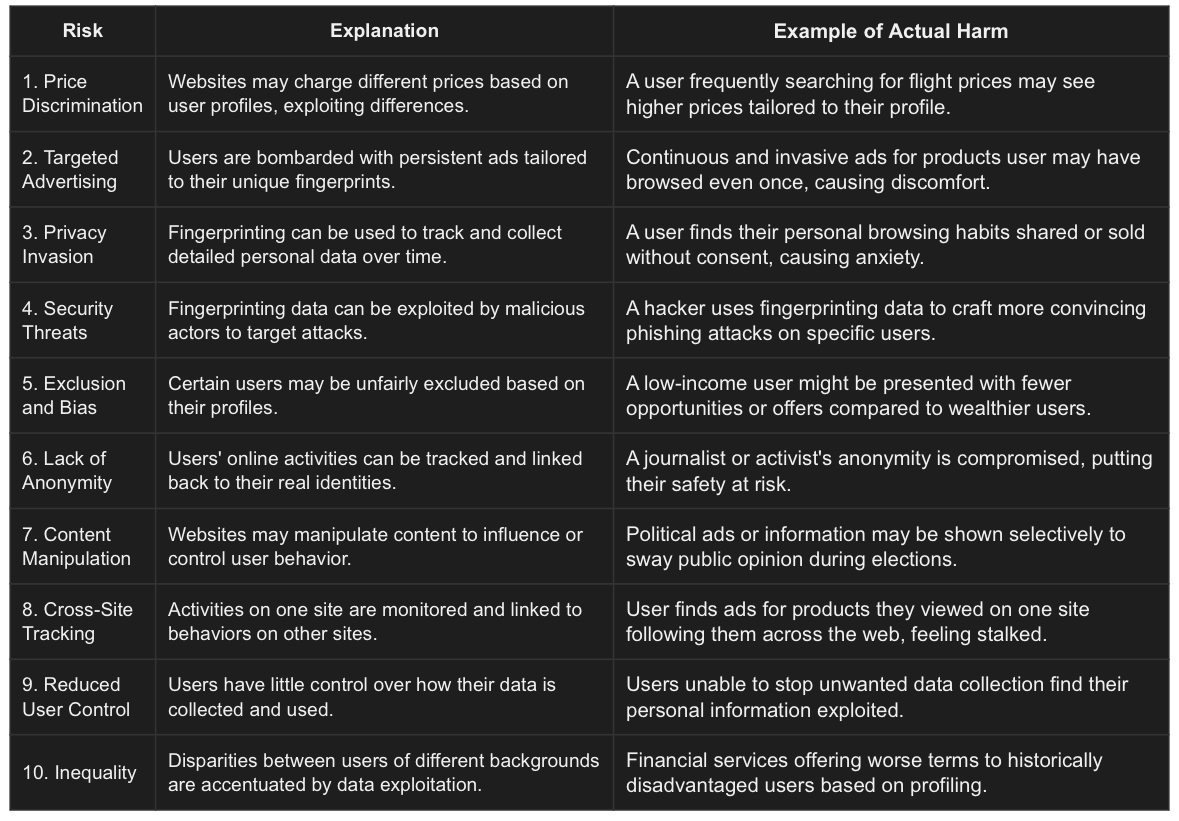Google does a lot of standards breaking things.
Like allowing a link on Google Apps Marketplace to open a new window (like popup) with POST instead of GET. (This pretty much ensures that buying an app will fail for browsers that follow the spec)
This garbage behavior is in Chromium as well?
#UninstallChrome
#SwitchToFirefox
Here, you forgot this:
\
Would everyone who is surprised by this please raise your hand? . . . That’s what I thought.
Not surprised, but still disappointed.
I am
Really? That’s not what the data from your api says /s
Keep your hand raised because I’m coming in for a perfectly-landed high-five!
perfectly-landed never happened before, and never will
License and registration, sir
You don’t need to actually write it, just raise your hand and we have registered your vote, either via your computer’s camera, Google Nest, Google Assistant or inferred it by analysing the WiFi data returned by your Google Mesh network.
Yet another reason to switch to Firefox, or even better, a hardened fork like LibreWolf !librewolf@lemmy.ml
What functionality would I lose/gain if I switch from Firefox to Librewolf? I’m admittedly an amateur in the privacy space, and I’ve been pretty content with Firefox + Ublock and container tabs for different profiles, but I consistently get the issue that my browser fingerprint is pretty unique, and I have no idea how to or even if I can anonymize that anymore.
Tangent note: I think browser fingerprinting is only a source of concern if you use VPN. Otherwise, your IP is already a good enough identifier, and quite likely doesn’t rotate often enough. Please someone correct me if I’m wrong.
Yeah I’d only worry about it if I were trying to buy drugs on the dark net or something. I guess if torrenting became illegal I would also worry.
deleted by creator
No. If you don’t want to be tracked and you are using a VPN, fingerprinting is a problem as well. Privacy is not concern just for drug dealers.
I worry about price discrimination

I appreciate the list. I’m not saying there aren’t valid concerns, just that in my day to day life it’s one of those items where the steps needed to avoid browser fingerprinting is usually more work than the value I personally get from my perspective.
I’ve looked into this, and I’m not clueless. I’ve developed websites, I’ve done a lot of stuff with Selenium / Puppeteer, and have toyed with Firefox browser extensions.
I understand the tools they use and it’s just very tricky to fully eliminate this type of thing. For example they can even use the browser window size. Are you going to randomly change window size to some novel dimension when you open up a tab?
What about the JS engine you use. For example using Firefox already narrows down your anonymity by like 95% or something because only a small amount of users use the browser. Etc etc
It’s hard to do this correctly, and I feel like VPN + private window usually takes care of the price fixing thing on the list, for example. When I’m searching for flights I usually do this.
I also use JS blockers in order to try and mess up the scripts that Facebook & Google have hidden over the internet to track you. But ironically, doing that again reduces your anonymity. They know that if their scripts don’t work on you, you get narrowed down again to a very small % of users.
It only takes a few of those pieces of data to be reasonably sure that it’s you. Browser fingerprinting is tricky to really avoid. It’s not impossible, of course. Just saying to really do it right it might be more effort than it’s worth.
The depth of fingerprinting really bothers me and I have accepted that the best at it will succeed.
It is tempting to find the world’s most popular default configuration and use that :) But that’s prob be something gross like Windows 10 & Chrome! In fact, that’d be second after Android & Chrome. Wonder how detectable VMing/emulating those configurations would be.
Agree with you and appreciate the detailed response!
Became? 🤔
Torrenting itself is not illegal. The distribution of copyrighted material that you don’t own is the illegal part.
Different places have different laws
Switching from Firefox to Librewolf has some pros and cons. Librewolf is a fork of Firefox focused on privacy and security, with telemetry stripped out and privacy settings maxed out by default. You’ll gain better out-of-the-box privacy protections, meaning less tracking and data collection without having to tweak settings yourself.
However, you might lose some convenience. Librewolf might not support certain Firefox features like Sync, since it relies on Mozilla’s servers (not sure about that point, maybe it does work). It can also break some websites due to the stricter privacy settings. Another thing to consider is that you won’t get updates as quickly as Firefox.
Regarding browser fingerprinting, it’s a tricky beast. Librewolf can help somewhat by making your fingerprint less unique, but it’s not a silver bullet. Tools like uBlock Origin and container tabs are great, but adding something like the CanvasBlocker extension can also help reduce fingerprinting. Ultimately, no setup is perfect, but Librewolf is a solid step towards better privacy.
Firefox sync is disabled by default but you can enable it in the settings.
I don’t really care too too much about privacy. If they get rid of the Pocket button then I’d be happy enough.
About:config
Extensions.pocket.enabled false

May I please steal this for future use?
I stole it too lol
Mostly it’s just FF but with more private defaults (that you can change in the settings trivially anyway), although there are one or two extras.
There is a potential issue, though. Librewolf runs behind, so security vulnerabilities, particularly for zero-day exploits, take longer to be patched.
Yes, why to do this?
Librewolf is not associated with Mozilla and does not receive their primary source of funding from Google like Mozilla does. I really like having the same browser and browser synchronization between my phone and desktop/laptop, so librewolf is out for me. They have no interest or resources to build an Android version. Waterfox does at least have desktop / android option and takes things at least one small step further away from Google.
Thanks for the answer! I run Windows, iOS and Linux across multiple devices, and sync is definitely needed for me as well. I’ll look into Waterfox!
The previous answer is misleading and partially just wrong. Firefox Sync works just fine in LibreWolf, you just need to enable it in the settings. I currently sync my LibreWolf browser on my Linux desktop to Firefox on iOS and Mull on Android, no issues whatsoever. The only Mozilla services that LibreWolf intentionally removes are their telemetry and Pocket.
U can sync regular mobile ff and librewolf. Thats what i currently have.
It is the same browser. LibreWolf doesn’t change much of the Firefox code, mostly just the configuration. They enable various privacy/security settings by default and remove Mozilla telemetry. You can go to the LibreWolf settings and enable Firefox Sync, and it will work just fine with your Mozilla account and other Firefox browsers.
For Android, I like to use Mull, it’s a hardened build of Firefox, similar to LibreWolf.
You can enable Firefox sync in Librewolf, it works fine.
if it’s fingerprinting you care about, i’d give mullvad browser a try. it’s a firefox fork tailored to increase privacy and blend you into the crowd (as long as you don’t change any setting/install addons). it’s very very neat.
Google Meet can show CPU usage, they aten’t trying to hide this.
Is this for malicious harvesting or is this part of their chrome device trust product for enterprises?
No, as far as I know this has nothing to do with attestation/verification for enterprise users.
WINK
Hmmm, no way this could ever turn into a security hole, I’m sure of it.
This that and the article are very light on details, but I couldn’t find an article deeper in details
My laptop, that I own and runs Linux that I installed, has chrome in it. I’m order to log into Gmail for work, it installs an extension that is capable of telling Gmail if my disk is encrypted. I know because you get an error message until my disk was actually encrypted. It was a big surprise to me, and I wonder if this is done by the same piece of code.
Btw would there be a way to do virtualization through perhaps docker or flat pack or chroot that can isolate chrome in a sandbox and prevent it from a) reading and writing files anywhere on any disk and b) get other data such as CPU, disk encryption etc?
My laptop, that I own and runs Linux that I installed, has chrome in it. I’m order to log into Gmail for work, it installs an extension that is capable of telling Gmail if my disk is encrypted. I know because you get an error message until my disk was actually encrypted. It was a big surprise to me, and I wonder if this is done by the same piece of code.
That’s strange, I’ve never heard of that before
Btw would there be a way to do virtualization through perhaps docker or flat pack or chroot that can isolate chrome in a sandbox and prevent it from a) reading and writing files anywhere on any disk and b) get other data such as CPU, disk encryption etc?
There are some isolation mechanisms on Linux like Firejail or Bubblewrap. The latter is used by Flatpak to sandbox applications. These are rather weak though, and Flatpak weakens the security of bwrap further. By default, Flatpak application permissions are also set in a Manifest file, which is created by the maintainer of the package. To get more control over your Flatpak sandbox, you need to use an application like Flatseal.
Docker (or containers in general) aren’t meant for isolation/sandboxing, but this approach would also work. I would create a container using Distrobox or toolbx, and install Chrome inside the container.
This will not prevent Chrome from getting your CPU information though. To protect against that, you would have to use a virtual machine (and spoof the your CPU model if you want to hide that from Chrome).
Sounds easier to switch to another browser at that point
OP apparently needs Chrome to log into an enterprise GSuite account, which has specific requirements, that are enforced by Chrome’s enterprise policy system. I don’t think this works in Chromium.
Oh I didn’t catch that my bad. I hope they get a work computer where this kind of stuff doesn’t interfere with private life!
Why do people still use Chrome?
Please uninstall it from everyone’s home pc and phone that you come into contact with
Because it’s fast and works well enough to keep the fame acquired over the last 10 years.
At the cost of zero privacy, data being stolen and other fundamental issues and morals that Google lacks.
Which is invisible to users, meaning they can ignore it or handwave it with “I haven’t got anything to hide”.
Or worse, “They already know everything about me, so why bother?”. One of my relatives says this. Kill me now.
Slower than Firefox
I’m a Firefox user on desktop and mobile, and I definitely feel like Chrome is faster on both platforms when I (have to) use it. But I prefer Firefox for the ideology and dev tools (on desktop), since I’m a web developer by trade, so the dev tools make a big difference for me.
I use both for my job and my subjective feeling is that chrome is faster. Js benchmarks seems to confirm it. Privately I use Firefox 95% of the time but I understand people who stay on chrome just out of inertia.
There was a short period a few years ago after the Quantum update that I would have partially agreed, because Firefox’s renderer was much smoother. But Chrome seems to have caught up, because it’s been much faster every time I test something in it in the yesrs since.
LibreWolf, Mull, Chromium, …
It’s apparently built into chromium
executing that command from the post returns the following on my Chromium:
VM68:1 Uncaught TypeError: Cannot read properties of undefined (reading 'sendMessage') at [HTML_REMOVED]:1:16 (anonymous) @ VM68:1It turns out Google Chrome (via Chromium) includes a default extension which makes extra services available to code running on the *.google.com domains - tweeted about today by Luca Casonato, but the code has been there in the public repo since October 2013 as far as I can tell.
It looks like it’s a way to let Google Hangouts (or presumably its modern predecessors) get additional information from the browser, including the current load on the user’s CPU. Update: On Hacker News a Googler confirms that the Google Meet “troubleshooting” feature uses this to review CPU utilization
The code doesn’t do anything on non-Google domains.
Maybe it’s because you tried it on a non Google site? Idk.
Hehe, I read that sentence, tried it on google.com
But forget what I said. I have the ungoogled variant of Chromium installed. No wonder that’s not in there…
Ianal, but this sounds like something worthy of suing their ass over. There’s not much Google would respond to and good luck beating their lawyers, but the only language they speak is $, so please try to take as much as possible away from them for this garbage.
Suprise Suprise!
Uhh do we know if this extends to sites.google.com?
You can check this yourself. Just paste this into the developer console:
chrome.runtime.sendMessage( "nkeimhogjdpnpccoofpliimaahmaaome", { method: "cpu.getInfo" }, (response) => { console.log(JSON.stringify(response, null, 2)); }, );If you get a return like this, it means that the site has special access to these private, undocumented APIs
{ "value": { "archName": "arm64", "features": [], "modelName": "Apple M2 Max", "numOfProcessors": 12, "processors": [ { "usage": { "idle": 26890137, "kernel": 5271531, "total": 42525857, "user": 10364189 } }, ...Not an area I’m familiar with, but this user says no:
https://news.ycombinator.com/item?id=40918052
lashkari 5 hours ago | prev | next [–]
If it’s really accessible from *.google.com, wouldn’t this be simple to verify/exploit by using Google Sites (they publish your site to sites.google.com/view/<sitename>)?
DownrightNifty 5 hours ago | parent | next [–]
JS on Google Sites, Apps Script, etc. runs on *.googleusercontent.com, otherwise cookie-stealing XSS >happens.
idk what to tell you if you’re still using chrome
Or anything Google for that matter. I see a lot of praise on Lemmy for their Pixel phones, but it wouldn’t surprise me if they eventually find there was a backdoor in their firmware all this time. Yes of course, I can not prove that right now, but this news about Google Chrome isn’t news for no reason. Don’t trust anything Google if you care about privacy, it is literally their business model (selling targeted ads).
Relevant username.
People don’t hate Google as much as they should. It’s cringeworthy how much they promote this ad company on this platform. They don’t even realze themselves they got comprised.
Well pretty much all computers have a backdoor to the CPU. That hasn’t been proven for Pixel phones though.
No, only Google has backdoors that are coming to light tome after time. Stop defending them Google ad fan boi.
Is this trolling or are you for real?
Wrll you have to use a pixel phone to use graphene os
Eat the ads then.
Yeah, I’m not super happy about that part, but don’t really know what to do
Use a Pixel phone. No more sketchy then any other popular phone manufacturer
It’s what I do. With degoogled os. But the proprietary blobs aren’t filling me with confidence.
Does your laptop run free software boot firmware? If not, it has the same issues as a phone, if not more. No smartphone runs fully free firmware.
I know all this and that’s not filling me with confidence, either. It’s why Framework is in my sights.
I fucking hate Google and wouldn’t use any of their (proprietary) software, but Pixel phones are amazing. Hear me out, Google is the only phone manufacturer right now, that puts extensive hardware security features like MTE, a secure element, as well as a bunch of others in their phones. The Google Titan M2 is based on an open-source project called OpenTitan, and Google has even contributed their own changes upstream. It’s based on the open RISC-V architecture, and it’s the most complete and secure implementation of a secure element that you can find in an Android phone. The only thing that comes even close is the “Secure Enclave” in Apple ARM chips, that are used in modern iPhones, iPads and Macs. I understand the concern about a potential backdoor in the firmware, but that’s a valid concern with basically every CPU on the market right now. x86 are ARM are completely proprietary, so you can’t really trust any CPU based on one of these architectures. The old Google Titan M1 was based on ARM, Apple’s Secure Enclave is also based on ARM, as well as Snapdragon’s SPU (which is incomplete and insecure anyway). The Titan M2, being based on open hardware architecture and firmware, is the most trustworthy secure element, despite being made by Google. It includes features like Insider Attack Resistance, support for the Weaver API, Android StrongBox hardware keystore implementation and is used for a secure implementation of Android Verified Boot. GrapheneOS is free, open-source, and doesn’t use any proprietary Google apps/services by default. Although I hate Google, a Pixel with GrapheneOS is currently the best option for a secure smartphone.
Google fan boy. Good luck promoting that shitty ad company.
Ah yes, definitely promoting Google
I fucking hate Google and wouldn’t use any of their (proprietary) software
I hope you realize how dumb your comment is
I do: DON’T
Does this also affect Chromium, or is it just Google Chrome?
The article mentions it being affecting Google Chrome through Chromium, but it’s not clear if it also affects Chromium on its own, or other Chromium-based browsers.
Chromium is also affected.
Doesn’t seem to work on cromite desktop (good)
Chromium alone depends on if it’s the Google version or the Un-Googled version. For the Google version of Chromium, it still has that hangouts extension. However, the Un-Googled Chromium has that extension removed via the build flags, the one to note is
enable_hangout_services_extension=false.As others have said though, it can also depend on what other Chromium-based is being used. Some browsers like Brave and including Vivaldi can have this turned off in the settings. Others like Edge and Opera are affected as well. However it doesn’t affect every Chromium-based browser.
It allegedly also affects Edge and Vivaldi, so it seems to be chromium not chrome
Just now tested in Vivaldi and it works, so yeah seems like Chromium 🥲





















